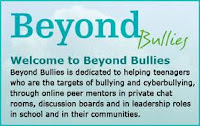Bullying, cyberbullying and teen deaths by suicide.
When will we get beyond bullying?
With many new organizations and anti-bullying groups forming, reaching beyond bullying is becoming a part of our culture.
In 2010, Beyond Bullies was founded by Melissa Sherman. She created the organization to give voice, confidence and hope to teens who feel depressed, alienated and alone because they are the targets of bullying and cyberbullying.
Beyond Bullies is the first online program in the United States, dedicated to helping teenagers who are the targets of bullying and cyberbullying, primarily through online and offline help from peer mentors.
E-Mentors is part of their program and it encourages teens to become mentors. Qualities of an E-Mentor are as follows:
Is your school or community ready to employ a Beyond Bullies program? Visit www.BeyondBullies.org for more information. You can also follow Beyond Bullies on Twitter.
Be an educated parent, you will have safer teens.
When will we get beyond bullying?
With many new organizations and anti-bullying groups forming, reaching beyond bullying is becoming a part of our culture.
In 2010, Beyond Bullies was founded by Melissa Sherman. She created the organization to give voice, confidence and hope to teens who feel depressed, alienated and alone because they are the targets of bullying and cyberbullying.
Beyond Bullies is the first online program in the United States, dedicated to helping teenagers who are the targets of bullying and cyberbullying, primarily through online and offline help from peer mentors.
E-Mentors is part of their program and it encourages teens to become mentors. Qualities of an E-Mentor are as follows:
- Personal commitment to be involved with another person for an extended time — generally, one year at minimum. Mentors have a genuine desire to be part of other people’s lives, to help them with tough decisions and to see them become the best they can be. They have to be invested in the mentoring relationship over the long haul to be there long enough to make a difference.
- Respect for individuals and for their abilities and their right to make their own choices in life. Mentors should not approach the mentee with the attitude that their own ways are better or that participants need to be rescued. Mentors who convey a sense of respect and equal dignity in the relationship win the trust of their mentees and the privilege of being advisors to them.
- Ability to listen and to accept different points of view. Most people can find someone who will give advice or express opinions. It’s much harder to find someone who will suspend his or her own judgment and really listen. Mentors often help simply by listening, asking thoughtful questions and giving mentees an opportunity to explore their own thoughts with a minimum of interference. When people feel accepted, they are more likely to ask for and respond to good ideas.
- Ability to empathize with another person’s struggles. Effective mentors can feel with people without feeling pity for them. Even without having had the same life experiences, they can empathize with their mentee’s feelings and personal problems.
- Ability to see solutions and opportunities as well as barriers. Effective mentors balance a realistic respect for the real and serious problems faced by their mentees with optimism about finding equally realistic solutions. They are able to make sense of a seeming jumble of issues and point out sensible alternatives.
- Flexibility and openness. Effective mentors recognize that relationships take time to develop and that communication is a two-way street. They are willing to take time to get to know their mentees, to learn new things that are important to their mentees (music, styles, philosophies, etc.), and even to be changed by their relationship.
Is your school or community ready to employ a Beyond Bullies program? Visit www.BeyondBullies.org for more information. You can also follow Beyond Bullies on Twitter.
Be an educated parent, you will have safer teens.

No comments:
Post a Comment